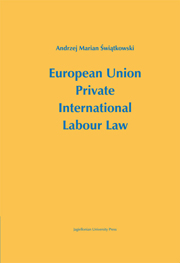Book contents
- Frontmatter
- Contents
- Introductory Comments
- Part I Preliminary Part
- Part II Conflicts of law of individual labour law in the light of the Rome Convention of June 19, 1980 and Regulation of the European Parliament and the Council of the European Communities No. 593/2008 of June 17, 2008 on the law applicable to contractual obligations (“Rome I”)
- Part III Conflict of law issues in individual labour law in light of the Regulation (EC) No. 864/2007 of the European Parliament and the Council of the EU (July 11, 2007), concerning law applicable to Non-Contractual Obligations (“Rome II”)
- Part IV Conflicts of law in collective labour law
- Part V Conflicts of law in social security – the coordination of national social security systems of EU Member States according to the regulation of the European Parliament and Council Regulation (EC) No. 883/2004 of April 29, 2004 on the coordination of social security systems
- Part VI International procedural labour law of the European Union
- Chapter 1 The subject of international procedural labour law
- Chapter 2 Jurisdiction, recognition and enforcement of judgements in matters of employment law
- Chapter 3 Judical co-operation of Member States in matters of employment law
- Selected bibliography
Chapter 3 - Judical co-operation of Member States in matters of employment law
from Part VI - International procedural labour law of the European Union
Published online by Cambridge University Press: 05 September 2014
- Frontmatter
- Contents
- Introductory Comments
- Part I Preliminary Part
- Part II Conflicts of law of individual labour law in the light of the Rome Convention of June 19, 1980 and Regulation of the European Parliament and the Council of the European Communities No. 593/2008 of June 17, 2008 on the law applicable to contractual obligations (“Rome I”)
- Part III Conflict of law issues in individual labour law in light of the Regulation (EC) No. 864/2007 of the European Parliament and the Council of the EU (July 11, 2007), concerning law applicable to Non-Contractual Obligations (“Rome II”)
- Part IV Conflicts of law in collective labour law
- Part V Conflicts of law in social security – the coordination of national social security systems of EU Member States according to the regulation of the European Parliament and Council Regulation (EC) No. 883/2004 of April 29, 2004 on the coordination of social security systems
- Part VI International procedural labour law of the European Union
- Chapter 1 The subject of international procedural labour law
- Chapter 2 Jurisdiction, recognition and enforcement of judgements in matters of employment law
- Chapter 3 Judical co-operation of Member States in matters of employment law
- Selected bibliography
Summary
Creating in the European Union the area “of freedom, security and justice” in labour issues, requires the cooperation of the courts and other institutions in the exercise of justice in these matters in Member States on matters relating to the service of judicial and extra-judicial documents, taking of evidence and the establishment of minimum common rules for the use of legal assistance by the workers. Minimum standards for judicial cooperation, creating a system of judicial assistance and legal aid, are treated as part of the EU system of cooperation and legal assistance in civil and commercial matters are ensured by the three instruments of the Council of the European Union: Regulation No. 1348/2000 of May 29, 2000 on the service in the Member States of judicial and extra-judicial documents in civil and commercial matters, Regulation No. 1206/2001 of May 28, 2001 on the cooperation between the courts of the Member States in the conduct of evidence in civil and commercial matters, and the Directive 2003/8/EC of January 27, 2003 on improving access to justice in cross border disputes by establishing minimum common rules relating to legal aid in such disputes.
Judicial assistance
With the term “legal assistance” I present the basic principles of cooperation of judicial authorities of the Member States deciding in matters of employment law, the limits of the procedural rules of international labour law in two ways: the first relating to the proper service to the interested parties of the judicial and extrajudicial documents and the second consisting of enabling the taking of evidence in these matters.
- Type
- Chapter
- Information
- European Union Private International Labour Law , pp. 322 - 330Publisher: Jagiellonian University PressPrint publication year: 2012



